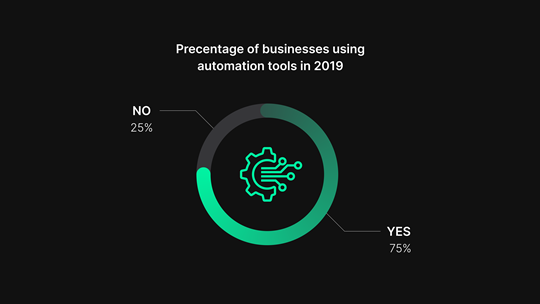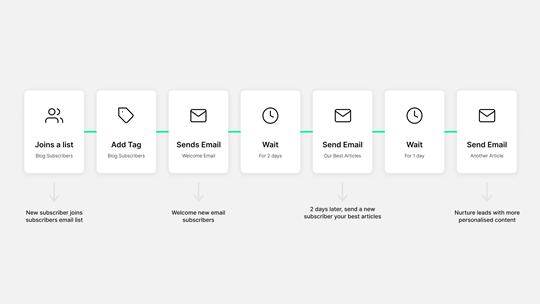The future of automation within performance marketing
In November 2021, Google introduced a new automated campaign type called Performance Max. The introduction of this new automated campaign type adds to the growing list of search automation campaign types within Google Ads, with the list growing as Google continues to push automated campaign types as the future of paid search advertising.
So, what is marketing automation?
In simple terms, marketing automation is technology (AI) that manages marketing campaigns and processes, marketing automation tools and pieces of marketing automation software. Marketing automation is designed to market brands more effectively online.

According to The State Of Marketing Automation in 2019, 75% of marketers stated that they already use at least one type of automated marketing tool, with this now being much higher in 2022 as AI and marketing automation continues to develop.
Current Automation Within Performance Marketing
The newly introduced Performance Max campaign type is just one of many examples of how performance marketing is edging closer and closer towards automation. However, paid search is not the only performance marketing channel which is continuing to push automated marketing, with many others also pushing for automation.
Social Media
Those who work within the social media marketing world will already be well aware of the social media automation tools available to help improve performance. In fact, according to The State Of Marketing Automation in 2019, 83% of marketers considered social media post scheduling to be the most suitable for automation, making social media the most popular case. The introduction of social media management tools such as SproutSocial and Tweetdeck have allowed brands to automate social media publication. Furthermore, this allows social media marketers to schedule posts ahead of time for upcoming events and campaigns.
On top of this, social media channels such as Facebook now allow brands to set up automatic responses to customers. This has no doubt had a positive impact on brands' customer service as the automated software available often suggests replies to messages or alternatively sends automated responses to a user’s online queries.
Email Marketing
Despite social media perhaps being the most suitable for automation, a 2018 report from Getresponse claimed that the most used marketing automation technique used by marketers is email automation with 64%. This is then followed by profiling and targeting (26%), and personalisation using dynamic content (23%). Perhaps it comes as no surprise that email marketing is the most used marketing automation technique when you consider the top-line results. According to Epsilon, triggered emails have a 70.5% higher open rate and 152% higher click-through rate than generic email newsletters.
An automated email marketing workflow allows marketers to create conditions, which result in personalised emails being delivered, based on how your audience engages with your business. An example of this could be when a user abandons their cart without purchasing. With the use of email marketing automation, brands can send the user a follow up automated email to prompt them to return to the website and complete the purchase.

Paid Search
Paid search engine advertising platforms such as Google Ads and Microsoft Bing Ads are constantly evolving and moving more and more towards automation. Within Google Ads there are already a variety of ways to use automated technology, ranging from IF functions when setting up ads, all the way to automated bidding strategies on your latest campaigns.
As recently as November 2021, Google introduced a new automated campaign type called Performance Max, following its initial introduction in October 2020. The new campaign type allows brands to advertise their products and services over several Google channels from a single campaign. Those channels include YouTube, Display, Search, Discover, Gmail, and Maps. Unlike traditional search campaigns, Performance Max utilises URLs supplied by content, as opposed to keywords. You can read more about the Performance Max campaign type here.
The Future Of Automation Within Performance Marketing
The sky really is the limit for the future of marketing automation within performance marketing. Over the past 10 years, automation has advanced a long way. At one time, digital marketing automation was just focused on automating repetitive tasks, however now it has much more depth, primarily due to AI and machine learning.
Performance marketing automation is advancing at an extremely fast pace. According to Email Monday, about 51% of companies used marketing automation in 2021. Companies such as Google are using their best AI learnings to make decisions based on the data available. As a result this is helping brands achieve much higher quality leads.
However, there are some areas of performance marketing which can’t be automated and likely never will (and us marketers would probably like it to stay that way!). Those areas include creative copy, creative design and of course the overall digital marketing strategy. These types of marketing tasks are areas which AI cannot replace, as they require creativity and critical thinking to make strategic, top-line decisions.
Ultimately, automated marketing is advancing fast, machine learning and AI are beginning to integrate alongside ‘traditional’ digital marketing methods and are helping digital marketers to make better, data driven decisions to improve overall performance. It is possible that at some point in the future, AI could work to predict consumer behaviour to forecast trends and create campaigns based on data driven predictions. However, it is fair to say we are some way off that yet!
Summary
The bottom line is that performance marketing automation is advancing fast and it's here to stay. Automation is quickly becoming a crucial part of any digital marketing campaign, helping to streamline workflow and create much more accurate, data driven decisions.
If your brand is not already using automation within your digital marketing strategy you're missing out on a huge opportunity, which your competitors are already capitalising on it. According to figures from Marketo, 76% of companies that implement marketing automation generate a return on their investment within the first year. Not only that, but 44% of them see a return within just six months.
Marketing automation also has great benefits on productivity according to Nucleus, who found that marketing automation boosts productivity by around 20% on average. Digital marketing automation removes repetitive tasks such as posting social posts at 1pm everyday, or having to do bi-daily search query reports on your Google Ads accounts.
If your brand is ready to take your first steps into AI and automated digital marketing, contact our experts at Cab Engine today.
Where would you like to go?
We’d love to understand more about your business needs and challenges. Talk to a team of exciting minds and create a collaborative partnership focused on driving growth for your business.
